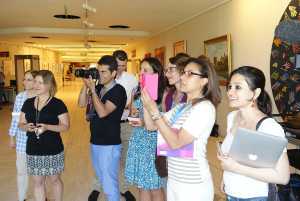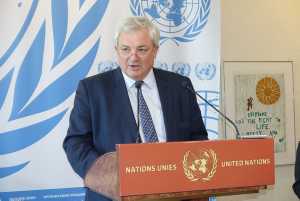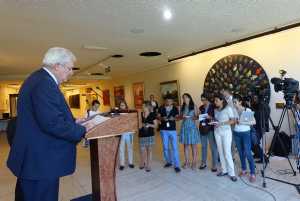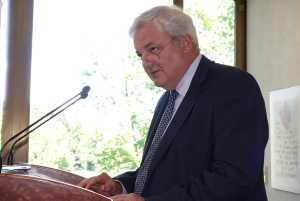UNDER-SECRETARY-GENERAL FOR HUMANITARIAN AFFAIRS AND EMERGENCY RELIEF COORDINATOR, STEPHEN O’BRIEN OPENING REMARKS TO THE HUMANITARIAN AFFAIRS SEGMENT OF THE 2015 ECONOMIC AND SOCIAL COUNCIL



 Geneva,
Geneva,
Photos: ActionPress/PM Virot
17 June 2015
Mr. Vice-President, thank you for your opening remarks, and your leadership in facilitating the Humanitarian Affairs Segment of ECOSOC. I would also like to thank Mr. Sam Kutesa, President of the 69th Session of the General Assembly for his remarks, and to convey the best wishes of the Secretary-General who could not be with us today.
It’s a great pleasure to be here and to meet you all as I begin my tenure. Today is a particularly fitting day for us to be talking about humanitarian aid because Muslims all over the world are entering the holy month of Ramadan this week - a time for empathy and solidarity with the less fortunate. I am sure we all have a special thought today for the people in Syria, Iraq, Yemen and elsewhere who are marking Ramadan in conditions of crisis.
As I take on this new role, I am all too aware of the horrors facing millions of people around the world.
During my very recent visit to Iraq, I met families with the most heartbreaking stories of fear, flight, loss and grief. In Yemen, some twenty million people - an unimaginable number, 80 per cent of the population - are now in need of humanitarian aid.
In Syria, 12.2 million people need humanitarian assistance; 7.6 million have been forced from their homes and four million people have left their country. In South Sudan, 4.6 million people face severe food insecurity. In Ukraine, 1.3 million people have been forced to flee the violence.
These figures and stories are probably familiar to all of us. But we hear less about the 20 million people who are at risk of hunger in the Sahel, including 1.4 million children under 5 who suffer from severe acute malnutrition. We don’t hear much about the 850,000 refugees and returnees who are currently hosted by Chad and Niger, two of the poorest countries in the world. All of which I have seen for myself during my numerous trips in the region, not least in Chad.
Each one of these statistics represents a personal tragedy for someone: separation from home and community; missing out on an education; failure to plant the seeds for next year’s harvest; a life of instability and uncertainty.
Humanitarian needs are at an all-time high. Yesterday, I released the mid-year update of the global humanitarian needs overview. We now need $18.8 billion to meet the needs of 78.9 million people across 37 countries. We have received just 26 per cent of that amount.
More than 110 million people around the world depend on humanitarian organisations, many represented here today, for life-saving assistance and protection.
Factors including demographic changes, urban violence, increased migration flows, the impact of climate change and new outbreaks of disease like ebola and chikungunya may contribute to increased vulnerability of people. It only takes a sudden price rise or a poor harvest to tip families and communities into crisis. And there is no sign of a let-up.
The humanitarian community has a strong record of adapting to changing circumstances and trying to do more and better for people in need. We underwent a major reform in 2005, and introduced the IASC Transformative Agenda, the Sphere standards, the Humanitarian Accountability Partnership, the Core Humanitarian Standards and many other initiatives. We are staying to deliver in more dangerous environments than ever before.
Our donors have not faltered in their generosity. Funding to inter-agency appeals reached a record $10.7 billion in 2014, and contributions to country-based pooled funds and the Central Emergency Response Fund received more than a billion dollars. But growing needs far outpace the resource available to meet them, leaving an ever widening gap. We need to reform and diversify the funding model, and I hope the Secretary-General’s High Level Panel on humanitarian financing will produce bold recommendations on how to secure more funding, which is more predictable and used more effectively.
Protracted crises have become the new normal and are also contributing to the problem. The average duration of a humanitarian appeal is now more than seven years. We have been providing lifesaving support to millions of people in the Democratic Republic of the Congo, Somalia and Sudan for more than a decade.
In some places, humanitarians have become default providers of essential services, disempowering affected people and perpetuating dependency. We must reverse this trend if we are to meet the long-term needs of people affected by crises.
This is the main message of the Secretary-General’s report on Strengthening the Coordination of Emergency Humanitarian Assistance of the United Nations that I present to you today.
I would like to highlight two areas in particular for our discussions.
First, our work with the many new organizations and groups that are involved in humanitarian action. These range from NGOs and civil society to diaspora communities and the private sector. Connecting and leveraging the comparative advantages of these different actors will enable us to bring additional resources, knowledge and skills to our work.
We must develop closer relationships with development actors, particularly in protracted crises. Joint planning with governments, humanitarian and development partners, based on risk over the long term, will enable us collectively to address the root causes of recurrent and chronic crises while meeting immediate needs.
We should make and act on multi-year plans for protracted crises, and these plans should include the end of the emergency phase, and our own gradual exit.
The second area for attention is the crisis in the protection of civilians.
Governments and parties to conflict bear the primary responsibility to protect and provide for the needs of people under their control. However, across conflicts, we see government forces and non-State actors directly attacking civilians, bombing hospitals and schools, and using explosive weapons in populated areas, despite knowing that over 90 per cent of the casualties will be civilians. We see parties to conflict use rape, sexual slavery and other forms of sexual violence as weapons of war.
Apart from being a moral outrage, this is eroding the credibility and authority of the United Nations, its entire membership and the international system.
The growing number of people that are uprooted and attacked need our global leadership. We must ensure compliance of parties to conflict with international law, and hold perpetrators accountable. We must speak truth to power, remind parties of their obligations and engage them on solutions to protect civilians and assist the most vulnerable.
I really look forward to hearing your views at the panel discussion on international humanitarian law on Friday.
We all know that we face tremendous challenges; but we also face enormous opportunities.
Consultations are well under way in preparation for the World Humanitarian Summit in Istanbul next May. Proposals and recommendations from these regional meetings and online discussions will be discussed and finalised at the Global Consultation here in Geneva in October.
The Summit itself will be a platform for Heads of State and Government, and leaders from civil society, the private sector, crisis-affected communities and multilateral organizations to announce their commitments to change.
The World Humanitarian Summit must be a global rallying call for humanity, putting fundamental principles and affected people at the centre of our response. It will be an opportunity to re-inspire and re-invigorate the world with the fundamental tenets of humanitarian work. I encourage you all to seize this defining moment.
As I begin my tenure as Under-Secretary-General and Emergency Relief Coordinator, I know I can count on your continued support for our joint efforts to meet the needs of the most vulnerable people in the world.
Thank you.


